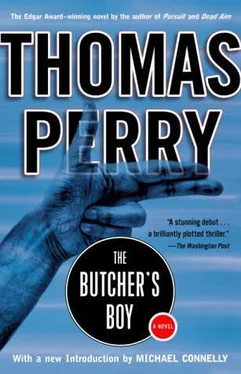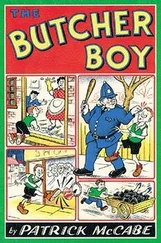Palermo just repeated, “Shoot them! Shoot them!” as Elizabeth watched the big car pull up behind. The car honked twice, and then the driver leaned on the horn.
Palermo had subsided into a muttered litany: “Shit, shit, shit. Shit, shit, shit.”
Elizabeth watched the two men. If one of them pulled out a gun, or even looked as though he were about to she knew she’d have to shoot. The car pulled abreast. Palermo yelled, “Hold on!” and stepped on the brake. Elizabeth saw the Cadillac flash past as her right shoulder hit the dashboard.
Palermo was gasping, slowing the car as the Cadillac diminished into the distance. Elizabeth managed to regain her balance, but only with difficulty. Palermo pulled to the side of the road and stopped.
The world sounded strangely quiet. Elizabeth watched as Palermo opened the door and walked out around to the back of the car. Her heart was pounding and her lungs didn’t seem to be able to take in enough air. Then she heard it. She didn’t have to look. Behind the car Palermo was throwing up.
When he came back to the car she didn’t say anything to him. He sat quietly while she drove. When she saw the little outpost a few miles down the road she still didn’t say anything to him, just pulled off the highway and stopped at the gas pump. Palermo climbed out of the car and disappeared into the men’s room.
The station attendant was young, probably just out of high school. His long blond hair was still wet from his morning shower, and his blue work shirt was crisp and clean. He yawned as he topped off the tank. The station must have opened at seven, she thought. Probably there wasn’t much business out here at seven. You’d have to leave home at five to get here from anywhere.
She paid the boy and looked for Palermo. She almost felt sorry for him. No doubt he was in the men’s room, white and shaking, his stomach turning itself inside out. She wasn’t feeling too great herself. She parked the car away from the pump and went to the ladies’ room. It was too late to prevent the headache, but aspirin might make it bearable until Carson City.
When Elizabeth returned she expected to see Palermo sitting in the car, most likely in the driver’s seat. He wasn’t. She got into the car to wait, a little angry. The longer he took, the longer it would be before she turned him over to the section chief in Carson City and went somewhere to sleep.
She wasn’t particularly surprised when the green Cadillac pulled around the building and onto the highway. It was perfect that they should go that fast, only to stop in that godforsaken coffee shop. They’d probably make up the time by covering the next hundred miles in less than an hour. She watched them accelerate rapidly, diminishing into the distance at a speed she didn’t feel able to estimate. Idiots.
Palermo. What was keeping him? This is what men are supposed to be built for, she thought. Big feats of strength and speed in a momentary emergency. Quick action, the massive infusion of adrenaline, and then a long period of repose. Not like women, built to last, the damned extra layer of fat for heat and cold and hunger, the nervous system tougher to stand pain. Babies.
Elizabeth looked at her watch. It was almost seven thirty. She remembered what he’d looked like when he left the car—pale skin, gasping for breath, his heart probably racing—oh God, his heart. That would be just about right. A heart attack in this place, fifty miles from the nearest doctor, probably. And nothing to do about it. Coffee and doughnuts. Air in your tires, sir? Better let me check your oil.
She got out of the car. The sun was warming the still air already. She walked to the gas station, past the boy, who was in the garage staring upward in consternation at the underside of a car on the hydraulic lift. She knocked lightly on the men’s room door, listening as much for the approach of another man as for Palermo’s answer. She heard nothing, so she tried again, this time louder. There was something absurd about it—no, everything about it was absurd. If she’d been a man she could have gone right in, or even gone with him in the first place. Maybe she should have anyway. At this hour, in this place what difference did it make? But he wasn’t really a prisoner. After the third knock she tried the doorknob. It was locked.
At the garage she said to the boy, “I wonder if you could do me a favor? The man with me went into the men’s room. I’m afraid he may be sick. Will you go in and check on him?”
The boy looked at her with sullen disapproval, then stared back up at the undercarriage of the car. It must be his, she decided. Then he said, “How long has he been in there?”
She said, “A half hour.”
The boy shrugged. “Okay.” She followed him to the rest-rooms, and waited while he unlocked the door and sidestepped in, as though it were a tenet of his faith to protect the privacy of all men from the intruding gaze of the insistent woman.
From inside she heard the sound of his voice, “Agh!” In a second he was back out, gaping at her in horror. He said to her, “We’ve got to call a doctor,” and ran around the building toward the office.
Elizabeth rushed into the men’s room. She could see Palermo’s feet under the door of the stall, placed as though he were sitting on the toilet. But on the floor around them was a pool of blood. She slowly pushed the door open and looked at him. He was sitting there fully dressed, with his head hanging down on his chest as though he were engaged in some profound meditation. She didn’t touch him, and didn’t look more closely. She let go of the door and walked outside into the air. Then she remembered the boy. She knew she should go tell him to change the call. Anybody could see from Palermo’s shirt what they’d done to his throat. The shirt had once been white. But there wasn’t any hurry, really. She couldn’t foresee any reason to hurry again. And out here the doctor probably doubled as the coroner anyway. The police would know. 47507Y. A blue license plate. Nevada.
29
It was just midnight when the sky above the black horizon began to glow pink, as though somewhere beyond this dark emptiness a city were burning. He was still twenty miles out when beneath the glow the impossible lights surfaced in a shimmering smear of white and blue and yellow and red.
His instincts resisted as the jumping, wavering apparition rose over the lip of the earth and began to resolve itself into the straight lines of bright streets and monolithic buildings bathed in color. He felt a strong urge to stay out here in the dark, empty desert, but he had to penetrate that eye of light. He had to have the name. Without it he could never be safe, because that man wanted him dead. The man wasn’t to be distracted or fooled or misled by feints and sudden shifts because he wasn’t even paying attention. He had signified the wish, and he was someone the others knew had the power to reward and punish at will, so it would remain a standing priority in a thousand minds until it was accomplished. That meant the name had to belong to one of fifteen or twenty men. That wasn’t many, but each of them was like a celebrity or a petty monarch surrounded by retainers and sycophants and guards. There was no way to reach all of them, and each wrong guess would strengthen the one who wanted him dead. He had to have the name.
He avoided the exit ramp that led onto the Strip and its nearest neighbor. He took the third exit and moved up Flamingo Road across the Strip toward the complex of lesser streets beyond the lights. He had few choices. Little Norman knew, but there was no way to make him reveal the name. He had existed far too long by working for everyone and appearing to know nothing about anyone. If he caught Little Norman alone the best he could hope for was to kill him. Little Norman was a professional. Orloff had known the name. Orloff was dead, but there was still Orloff’s office, the place where they’d killed him. Fieldston Growth Enterprises.
Читать дальше












